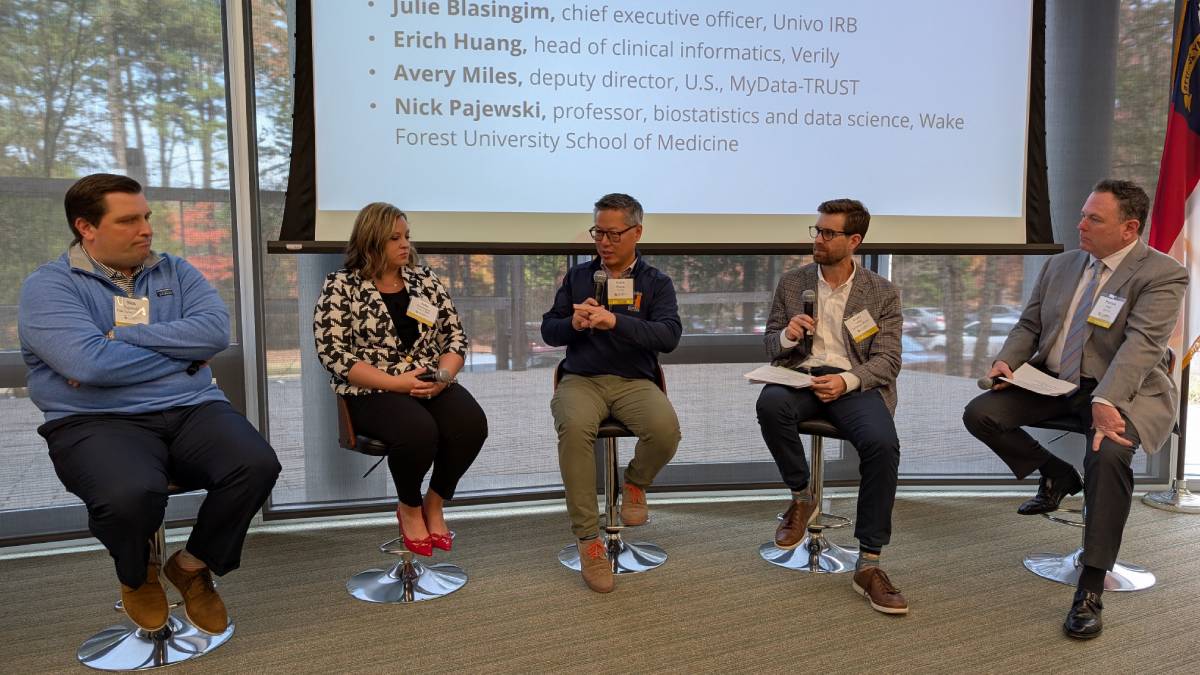Experts discuss in leveraging data to advance clinical research at NCLifeSci forum

A panel of industry leaders delved into the complex landscape of data usage and patient engagement in the life sciences and health care sectors at the NCLifeSci Clinical Trials Forum Nov. 19 at the NC Biotechnology Center.
The conversation highlighted the need for a more holistic and patient-centric approach to navigating the evolving regulatory environment and unlocking the full potential of data-driven innovation.
Patrick Daly, global vice president of IQVIA, moderated a panel that included
- Julie Blasingim, chief executive officer of Univo IRB;
- Erich Huang, M.D., Ph.D., head of clinical informatics at Verily;
- Avery Miles, deputy director, U.S. for MyData-TRUST; and
- Nick Pajewski, Ph.D., professor of biostatistics and data science at Wake Forest University School of Medicine.
The forum was sponsored by Chapel Hill Solutions and Frontier Scientific Solutions.
Daly set the stage by emphasizing the unique challenges faced by the med tech sector, where product-level data has historically been scarce compared to the pharmaceutical and biotechnology industries.
"For the first time ever, we have med tech companies giving us SKU-level data," he said, referring to the granular data now available in the orthopedics space.
This new access to detailed data presents both opportunities and hurdles, he said. While it allows for more in-depth analysis and insights, it also introduces complexities in terms of data governance, privacy and consent.
Blasingham drew on her extensive experience in human research protection regulations to highlight the importance of engaging research participants and ensuring they understand how their data is being used.
"The number one reason why participants don't sign up to be in a second study is because they feel like they're giving all of their specimens, their data, and they don't know what happened with it," she said.
The panelists discussed the evolving regulatory landscape, including the introduction of broad consent under the 2018 Common Rule and the new ICH Good Clinical Practice guidelines on informed consent for primary and secondary data uses. These developments aim to provide a more streamlined framework for obtaining participant consent and leveraging data for future research, they said.
The panel also acknowledged the challenges of navigating the patchwork of state-level privacy laws and the need for a more cohesive federal-level approach. Miles emphasized the importance of "permission mapping" to ensure compliance with the various regulatory requirements.
"If you're operating in a space outside of a GCP regulated framework, you're now exposed to the new U.S. state privacy laws that may come into effect," Miles said. "Now, there are ways to mitigate that exposure, but that should be part of the permission mapping and scoping exercise."
The discussion also delved into the role of health systems and the challenges of data harmonization and cybersecurity concerns. Pajewski highlighted the difficulties in merging data across different electronic medical records instances, which is a challenge within a single health system much less across different institutions.
"One of the things we're dealing with is even our own data is siloed. We're on three Epic instances across our own institutions, so we can’t even merge across ourselves, let alone merging with Duke or whatever outside entity," Pajewski said about the environment at Wake Forest.
Huang, a former surgeon, echoed concerns about the siloed and impoverished nature of the data ecosystem in life sciences and health care. He highlighted the need for better data liquidity and the importance of aligning quality metrics used in clinical trials with those used in routine health care delivery.
"The thing is, there's a cost to not doing anything, right?” Huang said. “So I think there's a broad societal cost where it's not appropriately leveraging all the all the data that we have.”
The panelists emphasized the need for a more risk-tolerant approach to data usage that balances the benefits of data-driven insights with the concerns of data security and privacy. They also stressed the importance of articulating the value proposition of data use to counter the risk-averse mindset often found in health care organizations.
The panel also explored the potential for personal health records and patient-controlled data as a way to empower individuals and drive innovation in health care. Huang discussed the need for a cultural shift in how data is managed, with patients taking a more active role in controlling and sharing their health information.
"I do think, ultimately, savvy individuals will say, OK, I feel safe. We'll reach the same level of safety as we have with credit card transactions one day, but then we need to push the control of the health record outside of health systems and individuals," Huang said.
Miles emphasized the importance of individual autonomy, choice and control as fundamental tenets of information privacy. He said he believes that if individuals understand and control how their data is used, they may become more willing to share their health information.
"As long as the individual has the choice and the control over how their data is used, ... and they have assurances from companies and health care providers that their data is only going to be used for those purposes that they've granted permission for, I think, combined with the value proposition of an improved user experience and greater access to health, I can certainly see a shift culturally around what individuals are willing to allow when it comes to their health data," Miles said.
